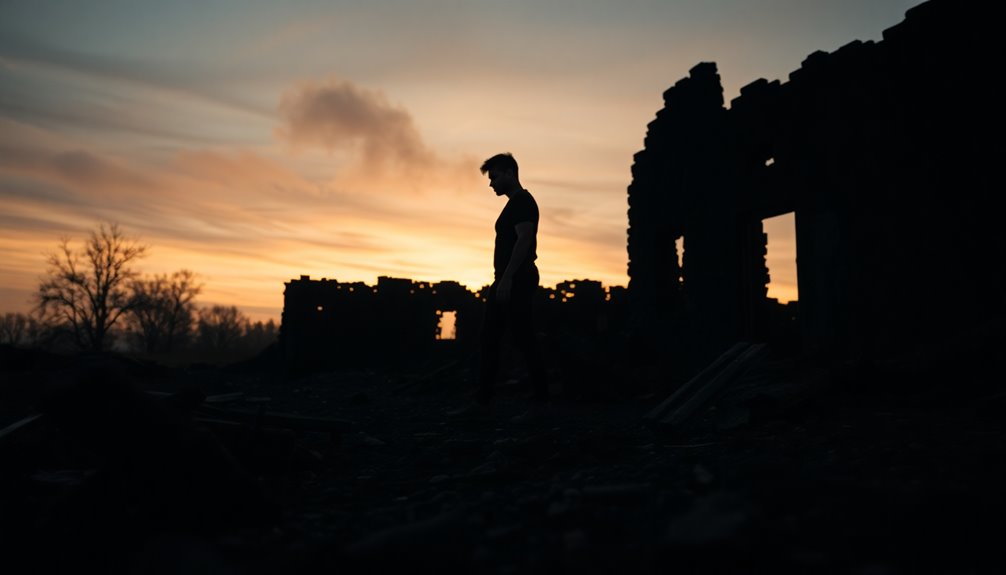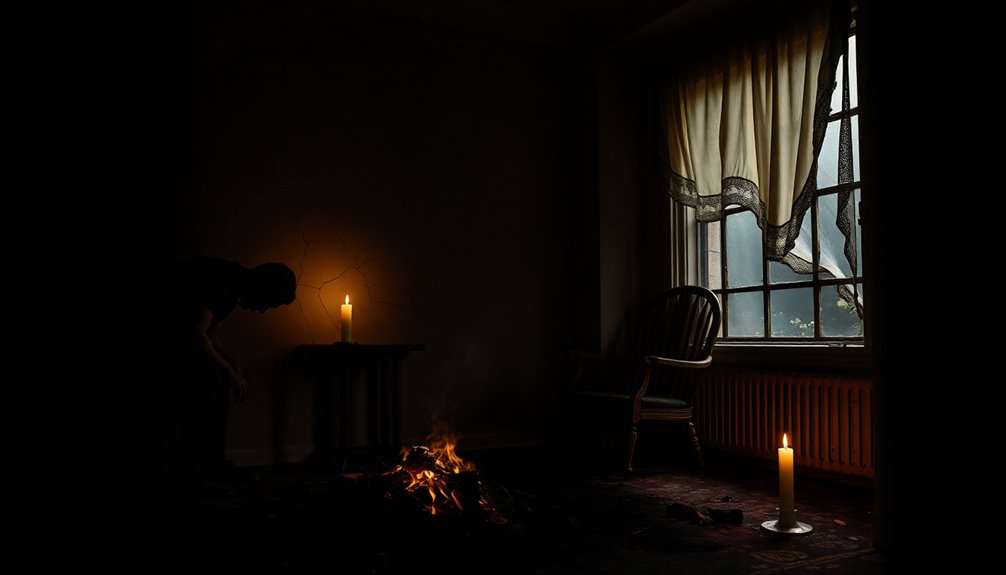*Home Fire* by Kamila Shamsie is a gripping contemporary retelling of tragedy that tells the story of the Pasha siblings. You'll witness their struggles with family loyalty, identity, and the weight of cultural expectations. Isma, Aneeka, and Parvaiz navigate a world shaped by their father's jihadist legacy, influencing their choices and relationships. The novel's powerful themes resonate with today's societal tensions, providing a fresh perspective on classical dilemmas. There's much more to uncover about their emotional journeys.
About the Author

Kamila Shamsie, a prominent voice in contemporary literature, was born in Karachi, Pakistan, in 1973. As an author, she's garnered significant accolades, including the prestigious Women's Prize for Fiction in 2018 for her novel *Home Fire*.
Her storytelling reflects the complexities of a Pakistani family while addressing broader themes of identity and tragedy. Shamsie's debut novel, *In The City By The Sea*, showcased her talent early on, earning her a spot on the shortlist for the John Llewelyn Rhys Award.
With a BA in Creative Writing from the University of Massachusetts Amherst and an MFA, she's honed her craft and established her influence in literary circles as a columnist for publications like The Guardian. Her work resonates with themes of personal growth, encouraging readers to reflect on their own journeys and challenges. Shamsie's writing has also sparked discussions about power dynamics in contemporary narratives, as it often examines the impact of systemic oppression on individual identities and relationships.
Plot Summary
As the Pasha siblings grapple with the weight of their father's jihadist past, their lives become a complex web of personal desires and familial obligations.
In Kamila Shamsie's Home Fire, Isma seeks independence in Massachusetts after years of caring for her siblings. In her quest for freedom, she mirrors Liesel's resilience as she navigates the challenges of her family's legacy amidst societal pressures. This struggle for autonomy reflects a broader theme of collective action against oppressive circumstances.
Meanwhile, Aneeka's romance with Eamonn, the son of a British politician, complicates their already strained family dynamics.
Parvaiz, longing to connect with his father's legacy, falls into the clutches of ISIS, creating a tragic rift within the family.
The narrative unfolds amidst political conflicts, showcasing how Isma's protective instincts clash with Aneeka's defiance and Parvaiz's choices. Ultimately, the story culminates in a tragedy that echoes Greek themes, exploring love, loyalty, and the weight of societal pressures. This exploration of familial bonds and resilience in adversity serves as a poignant reminder of the complexities faced by those navigating the aftermath of trauma.
Themes and Questions

In "Home Fire," you're confronted with the intense struggle between loyalty to family and allegiance to country.
The characters navigate their identities amid cultural conflict, forcing you to question how love shapes sacrifices in their lives. This struggle mirrors the complexities of family dynamics explored in literature, emphasizing how relationships evolve through challenges. Additionally, the book raises critical questions about the impact of social injustice on individual choices and communal ties.
As you explore these dynamics, consider how personal desires clash with societal expectations and the impact of such tensions on their relationships. The exploration of generational poverty in "Home Fire" further deepens the understanding of how these conflicts shape individual destinies.
Family vs. Country Loyalty
Loyalty often becomes a battleground in "Home Fire," where the Pasha siblings face the harsh realities of choosing between family ties and national allegiance.
You witness Isma's moral dilemma as she weighs her family loyalty against societal pressure to report Parvaiz's dangerous choices.
The conflicts deepen when Parvaiz decides to join ISIS, a move that threatens their identities and sense of belonging.
The novel raises critical questions about:
- The sacrifices required for family versus societal obligations.
- How the jihadist legacy shapes perceptions of Muslim families.
- The consequences of choosing one loyalty over another.
- The impact of external forces on personal bonds.
Through these themes, Shamsie critiques the complexities of loyalty in a divided world.
Identity and Cultural Conflict
While traversing their British-Pakistani identities, the Pasha siblings confront the cultural conflicts that arise from their heritage and the society around them in "Home Fire."
Isma, Aneeka, and Parvaiz each struggle to reconcile their personal aspirations with familial expectations, often leading to painful choices. Their Muslim identities shape their experiences, especially in a post-9/11 context where anti-terrorism policies create additional rifts.
The tension between personal desires and familial obligations manifests as Aneeka's love for Eamonn clashes with loyalty to Parvaiz and their father's past.
Shamsie effectively illustrates the immigrant experience, showcasing the challenges of balancing cultural heritage with the pressures of assimilation.
Ultimately, the siblings' journeys reflect the broader struggles of identity and cultural conflict within their community.
Love and Sacrifice Dynamics
As the Pasha siblings navigate the complexities of their lives, the theme of love and sacrifice emerges as a powerful force that shapes their decisions. You see this in their struggles with familial loyalty against societal pressures.
The narrative raises critical questions and dynamics, including:
- How far will you go to protect family?
- What sacrifices must be made for love amidst moral dilemmas?
- How do choices reflect your identity as an immigrant?
- In what ways does radicalization challenge familial bonds?
Through Aneeka's devotion to Parvaiz and Isma's caretaking role, Shamsie critiques the expectations placed on immigrant families, illustrating how love compels difficult choices and highlights the tension between personal aspirations and loyalty.
Character Development

Character development in "Home Fire" intricately weaves the lives of Isma, Aneeka, Parvaiz, and Eamonn, showcasing their struggles and growth against the backdrop of familial duty and ideological conflict.
Isma Pasha embodies family obligations, balancing her aspirations with the weight of responsibility after their mother's death. Her journey reflects the disillusionment experienced by many as they navigate personal aspirations versus societal expectations. This tension mirrors the historical injustices explored in "The Immortal Life of Henrietta Lacks," where individual desires confront systemic challenges.
In contrast, Aneeka Pasha's emotional intensity drives her love for Eamonn Lone, while steering through the moral dilemmas surrounding her brother Parvaiz's radicalization.
Parvaiz's character arc reveals his internal conflict, evolving from aimlessness to embracing ISIS ideology, influenced by their father's jihadist legacy.
Eamonn, entangled in this family drama, represents the clash between personal loyalty and familial ties, emphasizing the contrasting perspectives that shape the narrative's tension and moral complexities. The intricate dynamics of these characters resonate with themes of class struggles, reflecting the social realities that challenge their identities and relationships.
Writing Style
In "Home Fire," Shamsie's evocative language choices pull you into the emotional landscape of her characters.
You'll notice how the character-driven narrative structure intertwines personal struggles with broader cultural and political contexts. This approach not only enriches the story but also makes the characters' experiences resonate deeply with contemporary issues. Furthermore, the resilience shown by the characters reflects the importance of inner strength in navigating their tumultuous lives, highlighting how mental health plays a crucial role in their ability to cope and thrive amidst adversity. The narrative illustrates the tension between hope and despair, showcasing how characters confront their realities with courage and determination.
Evocative Language Choices
Evocative language choices in Kamila Shamsie's "Home Fire" draw you into the emotional landscape of the characters' lives. Her elegant prose captures the struggles they face, while sharp dialogue enhances character development and reveals complex motivations.
Here are some key elements that enrich the narrative:
- Free indirect discourse provides intimate access to characters' thoughts, deepening your connection.
- Alternating perspectives create varied narrative tones, echoing classic tragedies with modern relevance.
- Social media references ground the story in contemporary life, reflecting its complexities.
- Emotional depth permeates the text, engaging you with characters' experiences and dilemmas.
Through these choices, Shamsie creates a multifaceted world that resonates with today's readers.
Character-Driven Narrative Structure
While maneuvering the intricate web of family dynamics in Kamila Shamsie's "Home Fire," you'll find that the character-driven narrative structure immerses you in the siblings' emotional journeys.
By alternating perspectives among Isma, Aneeka, and Parvaiz, you explore their internal conflicts, revealing deep layers of loyalty, identity, and sacrifice. The use of free indirect discourse seamlessly blends their thoughts and feelings, enhancing emotional resonance throughout the novel.
Each section focuses on a different sibling, mirroring the five acts of a play and building tension. Shamsie's elegant prose, enriched with vivid imagery and sharp dialogue, grounds these characters' dilemmas in contemporary realities, making their struggles feel urgent and relevant in today's world.
Cultural and Political Context
Though it's rooted in personal stories, Kamila Shamsie's "Home Fire" simultaneously reflects broader cultural and political tensions, making her writing style particularly impactful.
- Contemporary reworking of tragedy highlights the emotional complexities of family loyalty.
- Political commentary addresses societal issues surrounding Muslim identity and radicalization.
- Vivid imagery and sharp dialogue create engaging scenes that resonate with current realities.
- Cultural context enhances the narrative, bridging classical themes with modern dilemmas.
Reception and Awards
"Home Fire" has garnered significant acclaim since its release, underscoring Kamila Shamsie's status as a prominent voice in contemporary literature. The novel was longlisted for the 2017 Man Booker Prize, showcasing its critical acclaim within the literary community.
In 2018, it won the prestigious Women's Prize for Fiction, further solidifying Shamsie's reputation. Additionally, "Home Fire" was shortlisted for the DSC Prize for South Asian Literature, highlighting its importance in representing South Asian narratives.
With a Goodreads rating of 4.02 from over 68,000 ratings and 7,384 reviews, the reception from readers has been overwhelmingly positive.
In 2019, BBC News recognized "Home Fire" as one of the 100 most influential novels, emphasizing its profound impact on contemporary literary discourse.
Political Commentary
As you explore "Home Fire," you'll find a powerful critique of government anti-terrorism policies and their devastating effects on Muslim families.
Kamila Shamsie uses the character Karamat Lone to showcase the moral compromises politicians make, reflecting the complexities of political identity.
Here are four key insights:
- Anti-terrorism policies isolate families, leading to tragedy.
- Shamsie challenges societal perceptions of Muslims post-9/11.
- The tension between loyalty to family and loyalty to the state is palpable.
- By reimagining themes from "Antigone," Shamsie connects ancient dilemmas to contemporary narratives about justice and belonging.
Through "Home Fire," you witness the profound impact of political commentary on personal lives, revealing the struggles faced by Muslim families in a climate of fear.
Literary Comparisons
Kamila Shamsie's "Home Fire" stands out not only for its political commentary but also for its rich literary connections. This contemporary retelling of "Antigone" reimagines themes of loyalty and sacrifice within a British Pakistani context.
Shamsie draws parallels to Jean Anouilh's adaptation, particularly in exploring familial conflict and the struggle between personal desires and societal expectations. Isma, as the protective older sister, offers a fresh perspective on sibling dynamics, diverging from traditional roles.
The novel skillfully navigates moral dilemmas faced by the Pasha family, addressing contemporary issues like terrorism and identity while steering clear of the incestuous elements of the original myth.
"Home Fire" expertly blends classical tragedy with modern storytelling, reflecting the complexities of the immigrant experience.
Community Feedback
How do readers perceive the emotional landscape of "Home Fire"? Many find Kamila Shamsie's novel resonates deeply, addressing contemporary issues faced by Muslim families.
The community feedback highlights a mix of experiences:
- An impressive Goodreads rating of 4.02 indicates overall satisfaction.
- Readers appreciate the emotional depth and exploration of identity and loyalty.
- Some mention a shaky start, but the writing's quality improves considerably.
- Critiques often focus on character portrayal, with some feeling characters lack depth.
This blend of praise and critique showcases the novel's impact on discussions about the immigrant experience, proving that "Home Fire" sparks crucial conversations within modern literary circles.
Your insights could further enrich these discussions!
Conclusion
In "Home Fire," you witness the intertwining of fate and choice, you feel the weight of loyalty and betrayal, and you grapple with the complexities of identity and belonging. Shamsie masterfully crafts a narrative that resonates with urgency and empathy, urging you to reflect on the consequences of our actions. As you close the book, you're left pondering not just the characters' journeys, but your own—a powerful reminder of the ties that bind us all.


